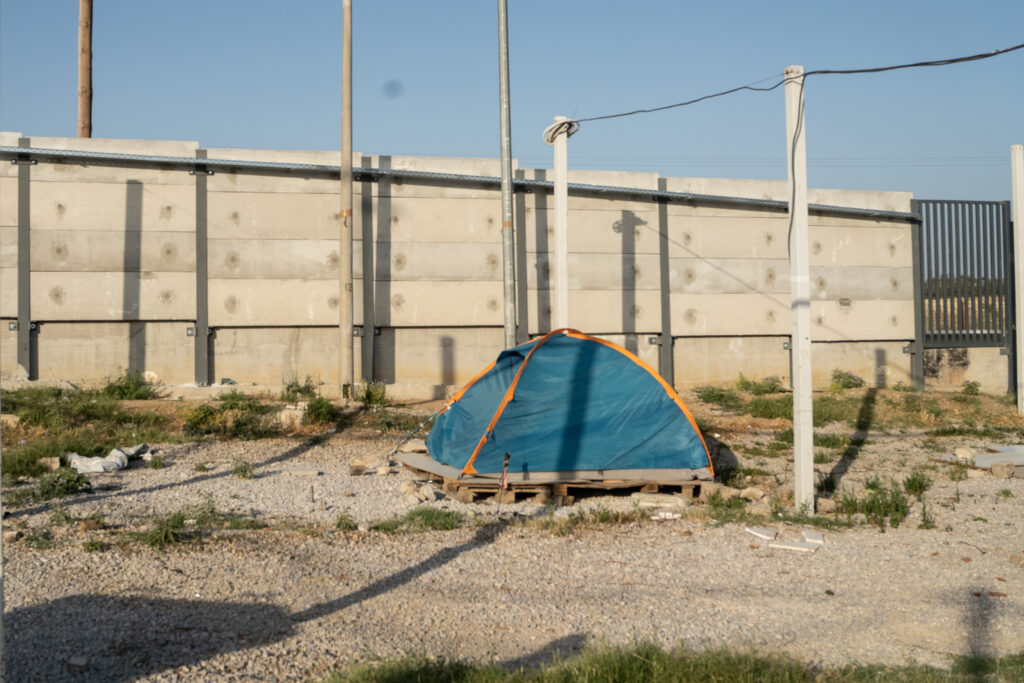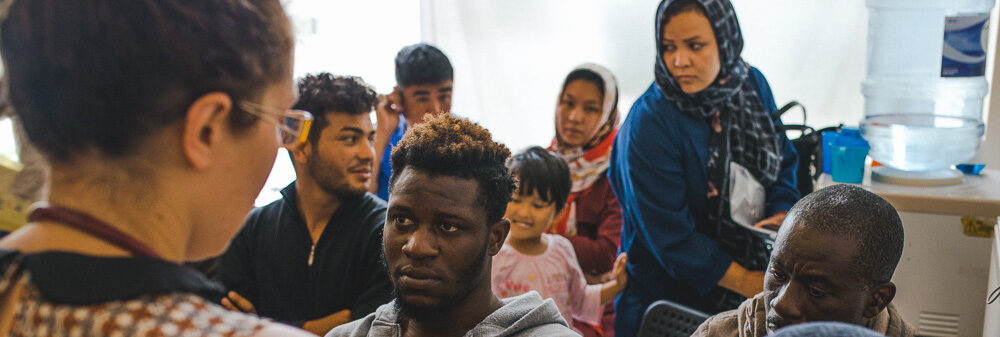
Decreasing temperatures, yet rising numbers of homelessness and people without appropriate shelter are to be expected in Greece this winter[1] .
The ESTIA II programme emerged from the European Union (EU)-funded ESTIA I programme, which was originally established by UNHCR in 2015 with the aim of facilitating the integration of asylum seekers into Greek society and addressing the specific needs of vulnerable people. In an attempt to achieve these desirable goals, the most vulnerable in society were provided with private accommodation, centrally located in various cities across Greece. In addition, and in a more holistic approach, the ESTIA programme offered psychosocial and mental health support, interpreters and referrals to medical actors. Meanwhile, as another pillar of the ESTIA programme, cash assistance was distributed to both vulnerable people and people in camps, enabling them to manage their personal finances independently according to their individual needs.
The original rationale for the establishment of the ESTIA programme can be found in the core values of the European Union: human dignity and human rights. On this ethical basis, the EU has agreed on fundamental rights and standard reception conditions that all asylum seekers should be granted as a minimum, as laid down in EU Directive 2013/33/EU. The key points of this directive are the obligation of all member states to ensure an “adequate” standard of living and the protection of the physical and mental health of asylum seekers. (Article 17(2) of EU Directive 2013/33/EU). Furthermore, it emphasises the need to assess and take into account the different vulnerabilities of asylum seekers and that these special needs must be met during the reception procedure (Art. 21). In addition, the EU has published a so-called “Action Plan on Integration and Inclusion” for the years 2021 – 2027. The Action Plan proclaims that “inclusion for all (…) at all stages of the integration process” is an important principle based on the core values of the EU, and adds that supportive measures at an early stage are “essential” for effective integration[2].
The ESTIA programme was generally seen as a success – in the eyes of beneficiaries of the programme, of the EU, the UNHCR and – allegedly – for the Greek government.
Khalil[3], an Algerian beneficiary of ELA who has been living in an ESTIA flat in Thessaloniki, has shared what differences it made for him to live in a flat rather than in the camp on Samos:
“The difference? I finally felt like a human again, I could cook whenever and whatever I want, I felt freer and more independent. It also helped me to integrate.”
Nothing less than ‘restoring normality to people’s lives, (…) dignified living conditions (…) [and] a home away from home’ was promised by ESTIA[4]. By the end of 2020, when responsibility for the ESTIA programme was handed over to the Greek government, it was promised that these goals would remain – although by then the programme had been severely curtailed, with a 30% cut in funding, leading to homelessness and desperation among the evicted asylum seekers[5]. Mireille Girard, a representative of the UNHCR, assured in the information leaflet “UNHCR Greece 2021” that the transfer of responsibility “(…) is not the end of ESTIA. The programme will now continue under the leadership of the government and with the unfailing support of the EU”. To ensure an effective transfer of responsibility, UNHCR and the EU have jointly deployed experts and provided massive financial support. In 2021, responsibility for cash assistance was also transferred from UNHCR to the Greek government. This change was accompanied by a recast of national legislation regarding eligibility for cash assistance: only people living in an ESTIA programme housing unit or in one of the official camps would receive cash assistance[6]. This change in the law can be seen as yet another way of depriving asylum seekers of their independence and human dignity.
Despite all the logistical and financial efforts and the promises made regarding the use of European funds and the proper integration of asylum seekers, the Greek Ministry of Migration announced already in February 2022 that the ESTIA II programme would be drastically scaled down in the coming months and then terminated completely by the end of the year[7]. For many asylum seekers and refugees, this decision represents a massive break with the lives they have built up: Regardless of their jobs, schools or other existing commitments, people were evicted from their homes. People who were still in the asylum process were moved to isolated camps, far from cities and public transport. Many other people who had already received a positive decision on their asylum application, but were still hosted by ESTIA, were evicted without any assistance in finding new accommodation. Finally, those who were still waiting for their appointment to submit their subsequent application, and therefore had no legal documents at the time, were evicted and left alone, homeless and often at risk of pushback. The announced ” unfailing support of the EU” turned into silent inactivity, even though both the EU Directive 2013/33/EU and the “Integration Action Plan” are blatantly and severely violated by the end of ESTIA.
Firstly, Art. 18(6) of the EU Directive 2013/33/EU clearly states that people should only be transferred from one accommodation to another if it is necessary and that, in case of transfer, they should be properly informed about their new address. In practice, most of the asylum-seekers affected by the forced transfer did not receive any written notification at all. At best, they received a phone call from their host organisation, which did not inform them of the exact date and place where and when they would be transferred. This effectively deprives asylum-seekers of their right to an effective remedy before national or international courts.
Mohammad[8], another former beneficiary of the ESTIA programme, explained how the eviction took place in his case:
“They (his host organisation, note from author) told me that I have to leave the apartment, they didn’t tell me why. They told me this on the phone, after that I came to their office and there they told me I don’t have the right to stay in the flat; they told me: you have 3, 4 days to leave otherwise the police will come.”
Moreover, the Greek Government has failed to provide any explanation as to why the transfers are considered ‘necessary’ within the meaning of Article 18. The main argument in this regard is that there are now fewer asylum seekers in Greece and consequently more space available in the camps, and that it is therefore necessary to rationalise the reception system[9]. However, since the ESTIA programme was not established primarily to address the lack of space in the camps, but to better integrate asylum seekers and ensure the well-being of vulnerable applicants, this cannot be considered a valid argument for the complete closure of ESTIA.
Secondly, Art. 18 nos. 3 and 4 of the EU Directive 2013/33/EU expresses the obligation of Member States to take into account the different vulnerabilities of applicants and to prevent any assault or gender-based violence. As the definition of vulnerable persons (Article 21 of the EU Directive 2013/33/EU) covers a very wide range of vulnerabilities, a variety of specific needs have to be met in order to ensure a safe stay in the accommodation. In particular, easily accessible social workers, psychosocial support and other specially trained staff are indispensable to guarantee the well-being of vulnerable applicants. Green MEPs have submitted a parliamentary question on what steps have been taken to ensure the implementation of the EU directive and action plan, but it has not yet been answered. In a nonsensical attempt to justify the end of ESTIA, Manos Logothetis, Secretary General for the Reception of Asylum Seekers in Greece, argued that “a two-tier reception system would be unfair and that everyone should receive the same level of services”[10]… An unseemly statement that contradicts both the above-mentioned directive and the very aim of his agency[11].
To paint the bigger picture, these developments are part of the general policy led by Nea Democratia, the ruling party since 2019. With the adoption of the “IPA” (the national asylum law) in November 2019, and its two following amendments in 2020, the rights of asylum seekers have been severely curtailed: shortening of deadlines, new rules for so-called safe third country applications, generalised use of fast-track procedures on the islands, lack of automatic substantive effect of certain remedies and further tightening of the legal framework[12]. With an election due next summer, the Conservatives are continuing to promote their anti-migration policies: Asylum seekers are regularly pushed-back[13] and this is presented as a legitimate ‘anti-immigration policy’[14].
It is sold by the ministry as a success that fewer people are applying for asylum in Greece, but are seeking safety in other parts of Europe[15]. In general, a large proportion of people who have been granted refugee status and travel documents in Greece go to other EU member states to reapply for asylum[16]. Since March 2022, Germany does not deport people back to Greece and accepts asylum applications from people who have been granted asylum in Greece as admissible due to the serious risk of inhuman and degrading treatment of asylum seekers and refugees there[17]. The constant fear of being pushed-back (even with legal documents and hundreds of kilometres from the Turkish-Greek border[18]), lack of integration, marginalisation and lack of support structures, as well as general discrimination and arbitrary police violence, force people to continue their search for safety elsewhere.
The end of the ESTIA programme, a drastic measure that contradicts the advice of experts, is another step taken by the Greek government to rid the country of people labelled as ‘illegal migrants’ – stacking them up in camps or pushing them into homelessness in the middle of winter. Khalil was evicted from his home in October 2022 and has been living on the streets ever since. And he is just one of too many who have been left destitute by the closure of ESTIA.
[1] Homeless and hopeless – do the human right thing – raising our voice for Refugee Rights, January 2022, p. 10.
[2] Action plan on integration and inclusion 2021-2027, European Commission, page 7.
[3] Name changed; interview conducted by the author.
[4] ESTIA: A Home Away From Home, information flyer by UNHCR Greece, Nov 2015 – Sept 2021.
[5] INFOMIGRANTS, Greece reduces funding for migrant housing program, 22.06.2020 https://www.infomigrants.net/en/post/25509/greece-reduces-funding-for-migrant-housing-program, accessed 17.01.2023.
[6] The amount of cash assistance differs depending on the individual situation; 75 EUR for singles in camps, 135 EUR for a couple or a single parent with a child, 160 EUR for three people family: https://help.unhcr.org/greece/living-in-greece/access-to-cash-assistance/, accessed 25.01.2023.
[7] Ministry of Immigration and Asylum, Press Release of 22-02-2022.
[8] Name changed.
[9] ParallaxiMag, Εκτός διαμερισμάτων του προγράμματος Estia, οι πρόσφυγες. Διαβάστε περισσότερα εδώ, 15.11.2022, https://parallaximag.gr/epikairotita/ektos-diamerismaton-toy-programmatos-estia-oi-prosfyges, accessed 07.12.2022.
[10] ibid
[11]“The mission of the General Secretariat for the Reception of Asylum Seekers is to establish humane and respectful reception conditions that abide with international laws for third-country nationals in Greece” https://migration.gov.gr/en/grammateies/geniki-grammateia-ypodochis-aitoynton-asylo/, accessed 07.12.2022.
[12] ECRE, Asylum in Greece: A situation beyond judicial control?, legal note #9, 2021, p. 9.
[13] ECRE, Greece needs EU help to protect external borders, minister says, 21.01.2023, https://www.ekathimerini.com/news/1202866/greece-needs-eu-help-to-protect-external-borders-minister-says/, accessed 25.01.2023; ECRE, Greece: Increase of Pushbacks with Impunity Amid Ongoing Crackdown on Solidarity, Türkiye Considered “Safe” by Greek Authorities Sets New Record of Deportations, Thousands of Vulnerable Refugees Left Without Adequate Accommodation After Closing of ESTIA Programme, 13.01.2023, https://ecre.org/greece-increase-of-pushbacks-with-impunity-amid-ongoing-crackdown-on-solidarity-turkiye-considered-safe-by-greek-authorities-sets-new-record-of-deportations-thousands-of-vulnerabl/, accessed 25.01.2023.
[14] The normalization of Pushbacks in Greece, Biopolitics and Racist State Crime, in: The State Crime Journal 10.2 2021, p. 239f., https://www.thenationalherald.com/theodorikakos-briefs-27-eu-ambassadors-at-evros-on-effective-protection-of-eus-external-borders/, accessed 25.01.2023.
[15] Tornos News, Fewer asylum seekers but more refugee arrivals up in Greece during June 2022, 27.07.2022, https://www.tornosnews.gr/en/greek-news/economy/47505-fewer-asylum-seekers-but-more-refugee-arrivals-up-in-greece-during-june-2022.html, accessed 08.12.2022.
[16] INFO MIGRANTS, Thousands of refugees granted asylum in Germany after receiving protection in Greece, 04.07.2022, https://www.infomigrants.net/en/post/41682/thousands-of-refugees-granted-asylum-in-germany-after-receiving-protection-in-greece, accessed 08.12.2022.
[17] INFO MIGRANTS, German court rules that refugees cannot be deported to Greece, 27.01.2021, https://www.infomigrants.net/en/post/29897/german-court-rules-that-refugees-cannot-be-deported-to-greece, accessed 08.12.2022.
[18] Border Violence Monitoring Network, https://www.borderviolence.eu/violence-reports/?ri-incident-location-geo-radius=50&ri-pushback_from=Greece&ri-pushback_to=Turkey&ri-underage-involved=all&ri-intention-asylum-expressed=all&ri-page=191, accessed 18.12.2022.




Pingback: vxi.su
Pingback: iwbc.ru
Pingback: djss.ru
Pingback: pstat
Pingback: ddfr.ru
Pingback: imkor.ru
Pingback: edu-url-http.ru
Pingback: Free-Proxy-socks5-socks4.ru
Pingback: iu0000ytre
Pingback: sitnikov
Pingback: dilts.g-u.su
Pingback: xblx.ru
Pingback: r2f.ru
Pingback: psy
Pingback: 439W6fo